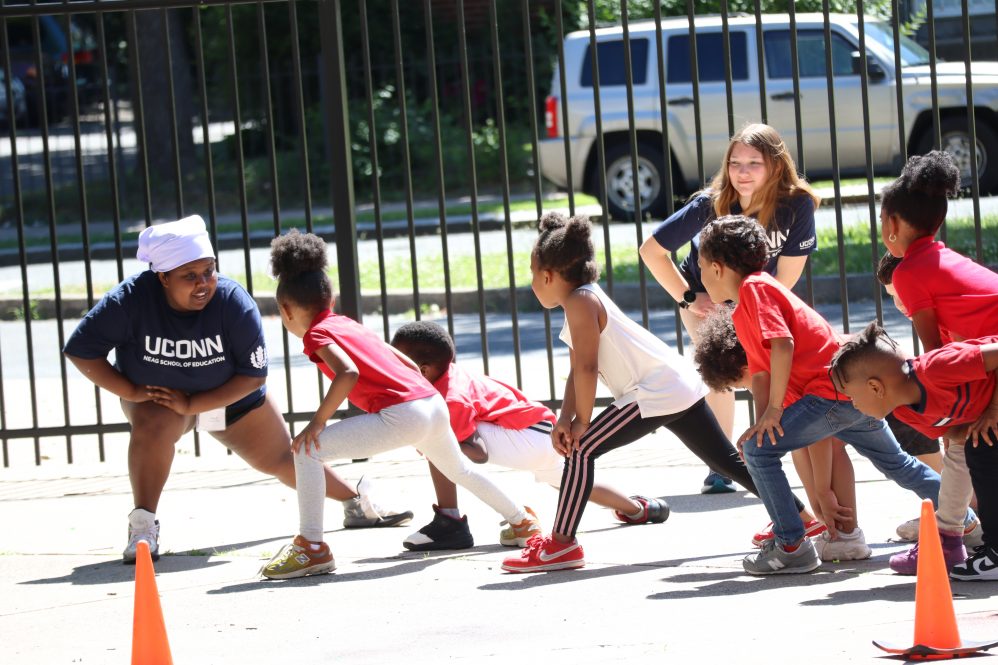Since the mid-1990s, funding from the U.S. Department of Agriculture (USDA) has been allocated to the state of Connecticut and distributed among different agencies that work to provide programs focused on nutrition and physical activity education to people eligible for the Supplemental Nutrition Assistant Program (SNAP-Ed). UConn is home to one such agency, UConn Husky Nutrition & Sport, which recently received another $4.9 million from the USDA for the next three years.
“I congratulate Dr. Ann Ferris, Dr. Jennifer McGarry, and the entire UConn Husky Nutrition & Sport team on their renewed USDA funding,” says Jason G. Irizarry, dean of the Neag School of Education which houses the interdisciplinary team. “This initiative is an incredible example of the Neag School’s community outreach, which has a direct impact on individuals across Connecticut every day. I am proud of the strong community partnerships Dr. Ferris and Dr. McGarry have already cultivated, grateful for their steadfast support of our Neag School students over the years, and excited to see how this new funding will further enhance their team’s important work.”
The USDA funding is just the latest in a string of recent accomplishments for UConn Husky Nutrition & Sport (UConn HNS):
- Husky Nutrition and Husky Sport combined into one entity in 2021
- The team celebrated more than 20 years of growth and the launch of a new website and branding in 2023
- New postdoctoral research fellows have been welcomed each of the past three years
- Just this past summer, UConn HNS hired new staff members and led successful nutrition and physical activity education efforts across Connecticut.
Ferris, professor emerita in the School of Medicine, was a founding member of the team that first brought SNAP-Ed funding to Connecticut, leading to decades of social marketing campaigns and strategic change efforts aimed at increasing awareness and access to relevant resources and opportunities to empower individual, family, and community health.
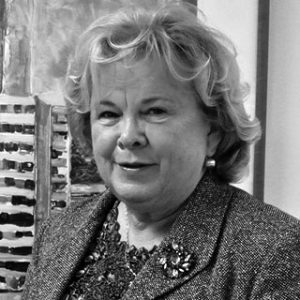
“Starting with conversations at the national level of USDA and a stated desire for nutrition education programs particularly working with older populations in Connecticut, our immediate efforts focused on partnering alongside people and agencies already working within communities,” Ferris says. “Soon came the usual challenges, such as securing a one-to-one dollar match of state to federal funding or needing to align administrative requirements across so many different stakeholders. …I just remember thinking at the time that there were just so many dedicated people that were able to get everything launched between the community, University, state, and federal levels.”
Since that time, Ferris has served as a leader of a team of dedicated staff and UConn students, UConn courses, and many collaborative partnerships within Connecticut’s communities. Over the course of her career, she has been awarded more than $28 million in funding from the USDA; National Institutes of Health; the Centers for Disease Control and Prevention; and private foundations, as well as a full career of scholarly articles, policy reports, and conference presentations.
“I truly learned from so many people at every turn,” she says. “The willingness of parents and families to collaborate with us to build programs and how they shared their time, expertise, and feedback … that part just overwhelms me. Partnerships drove all our endeavors. It is so gratifying to witness Dr. McGarry, and her team take these programs in new directions, and I am glad to still be able to play a very small role with SNAP-Ed.”

With more than 40 staff and student employees on the team this fall, UConn HNS continuously strives to strengthen the SNAP-Ed workforce in Connecticut. The team offers culturally and contextually relevant trainings; workshops that develop skills around teaching and learning across the lifespan; and professional development on best practices associated with nutrition, sport sampling, and physical activity education.
“The evolving UConn HNS organization can learn from what has worked as well as extend the impact of community-campus collaborations across the state moving forward,” says McGarry, executive director of UConn HNS and professor in the Neag School’s Department of Educational Leadership.
This past summer, UConn HNS led nutrition and physical activity education efforts with 18 partner sites in five towns. These partnerships allowed for nearly 1,100 participants, ages 4 to 18, to take part in 240 direct education sessions. Catalina Quesada, a registered dietitian and community education specialist working with adults and families throughout the academic year, serves as a UConn HNS staff leader during the summer. She, and other established staff members like her, also led the recruitment, hiring, training, and supervision of 10 UConn students that worked 30-35 hours a week for 10 consecutive weeks in the summer.
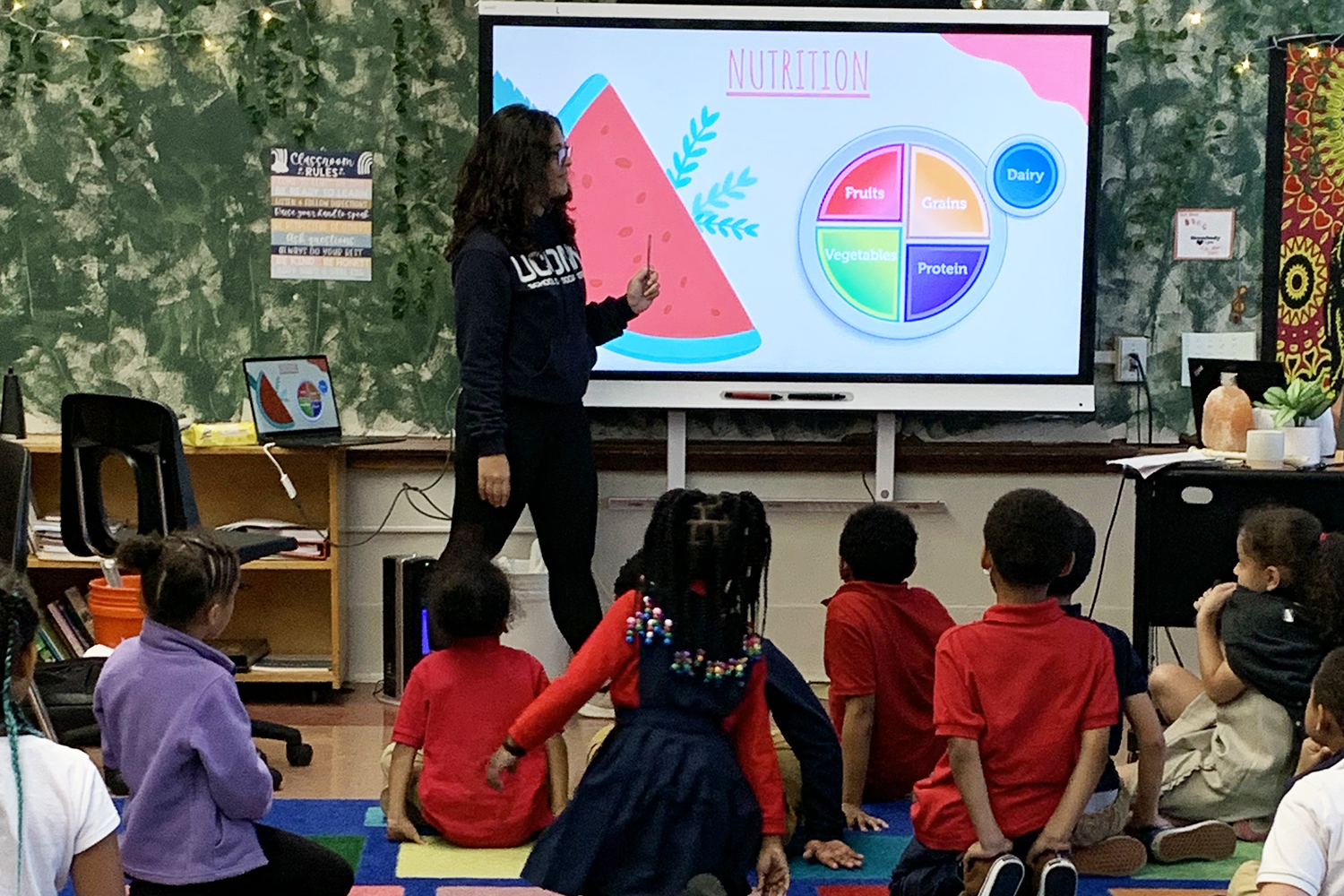
“Summertime is always fun for us as staff and for the newly hired students who will be delivering our programs in the community,” Quesada says. “A lot of work goes into planning, training, and executing the summer program. It takes many hours of very intentional work tailored to the development of the students and to the correct program alignment for our partnering sites. Our students always learn a lot from the programs they facilitate but more importantly, they learn from our community partners and the participants who come to our programs.”
Many of the UConn students who were on staff over the summer have chosen to stay involved with UConn HNS into the academic year. In their different roles, students continue to support partnerships and programs, develop curriculum, facilitate evaluations, serve as van drivers, and provide peer mentoring to new students who have recently joined UConn HNS.
“It is very fulfilling to experience how much the students grow throughout the summer internship, stay involved, and become more confident facilitators as they continue to engage in critical reflection, improvement, and connectivity with people and communities in Connecticut,” Quesada says.
In addition to undergraduate students, UConn HNS has supported new postdoctoral positions in each of the past three years. The postdocs serve as course instructors, support evaluation and research efforts, and lead community-based partnerships and programs.
“Starting with Kolin Ebron ’14 MS, ’21 Ph.D., who has gone on to become the assistant director of university opportunity programs at Eastern Connecticut State University, and followed by Julián Alonso Restrepo, who is now an assistant professor of sport management at UMass Boston, our team continues to benefit from the addition of talented postdocs.” McGarry says.
Currently in their second year as a postdoctoral research associate, Roc Rochon serves as an important connector across organizational efforts.
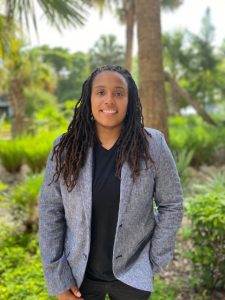
“Being part of UConn HNS has created opportunities to work closely with faculty, staff, students, and community partners,” Rochon says. “Serving on multiple working groups has extended pathways for me to pursue scholarly activities, lead in the process to refine course curricula, develop new strategies, and teach in the classroom … all the while connecting directly with community partners to build relationships and be a support for our team’s efforts with everyday learning.”
Along with Rochon, Ferris, and other staff and students, Neag School assistant professor-in-residence Danielle DeRosa ’09 (CLAS), ’15 MS, ’23 Ed.D. leads the organization’s People Team. Throughout the year, the team develops and facilitates holistic and professional development sessions for the larger UConn HNS group.
“As an organization, we prioritize the development of our staff and students to ensure positive engagement and learning,” DeRosa says. “This investment allows us to be prepared and relevant practitioners, as well as collaborative and supportive partners. As part of our SNAP-Ed funding, we’ve continued to recruit, develop, and promote professionals working within communities and supporting healthy and active lifestyles. Our professional development allows us to grow in our own capacity to learn with and from each other, with the goal being able to contribute alongside community partners, families, and children toward improved health outcomes.”
As part of that ongoing team development, UConn HNS welcomed three full-time staff members over the past six months: Veronica Jacobs ’16 (CLAS); Sarah Larocque ’09 (CAHNR), ’12 MS; and Brandon Keaton. Jacobs was involved with the organization as a UConn undergraduate student, before going on to complete a master’s degree in higher education and student affairs, holding different professional roles at multiple institutions. Now back with UConn HNS, Jacobs serves as the lead staff member overseeing a longtime partnership with Fred D. Wish School in Hartford that includes supervising 10 funded graduate assistants, while also contributing her expertise and leadership skills as part of the People Team.
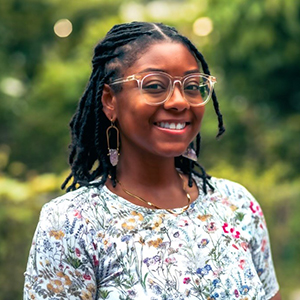
“Returning to UConn HNS has gifted me opportunities to build new connections and a deeper awareness of the assets and resources in Hartford, a city that has been home for the past five years,” Jacobs says. “I’m excited to leverage my experiences in student development and social justice education to co-create intentional, joyful, and community-centered programs at Wish School, and support the holistic and professional growth of UConn students.”
Larocque has joined the team as a registered dietitian, with professional experience in the health industry and counseling work alongside families and children. She will be a leader with the Husky Reads program, which includes over 15 partner sites and more than 600 pre-kindergarten student participants each year. Often an entry point into UConn HNS for new UConn students, Husky Reads also operates as a two-credit course that is cross-listed in the departments of Nutritional Sciences and Educational Leadership during the fall and spring semesters.
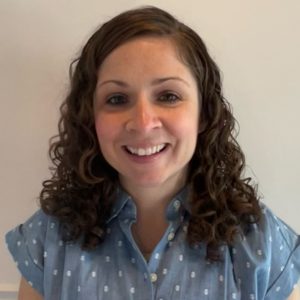
“I am just thrilled to be back at UConn, a place that has meant so much to me personally and professionally,” Larocque says. “I am excited to contribute my expertise as a registered dietitian, combining my love of working with children and families while also teaching classes and supporting UConn students as developing professionals.”
Keaton is new to UConn, yet brings experience as a former athlete, coach, and educator. He will be working with a few different programs, as UConn HNS works to enhance curricula and partnerships focused on physically active games and play. PreK-12 school-based efforts will include recess, movement within classrooms, and physical activity as part of the everyday environment, as well as other family and community settings such as before and after school, on the weekends, and during the summertime.
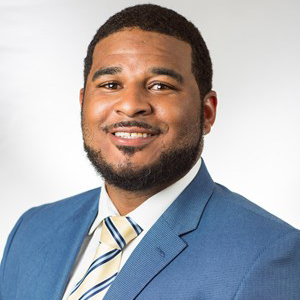
“My family and I recently relocated to Connecticut,” Keaton says. “I am looking forward to building relationships, growing partnerships, and serving the community. Focusing on physical fitness, movement, and health — all of that is just what I feel called to do.”
Moving forward, an expansion of partnerships is on the horizon for UConn HNS, with a mixture of educational programs focused on increasing healthy eating and physical activity. UConn HNS also continues to grow its consulting efforts, working with partners to provide professional development workshops, support evaluation processes, and co-design social marketing campaigns. With the recent staff additions, there is a high level of excitement about enhancing all aspects of the organization.
“The sustained efforts of Husky Nutrition, Husky Sport, and now Husky Nutrition & Sport are rare to see,” McGarry says. “We are often told by our partners that so many university-based programs come and go. We remain committed not only to continuing partnerships with individuals, organizations, and communities, but also to evolving our approaches to prioritize relationships, recognize the strengths of everyone involved, and celebrate culture as part of our collaborations.”
To learn more about UConn Husky Nutrition & Sport, visit huskynutritionsport.education.uconn.edu.
